🎗️Lonny's War Update- October 562, 2023 - April 20, 2025 🎗️
🎗️Day 562 that 59 of our hostages in Hamas captivity
**There is nothing more important than getting them home! NOTHING!**
“I’ve never met them,But I miss them. I’ve never met them,but I think of them every second. I’ve never met them,but they are my family. BRING THEM HOME NOW!!!”
There is no victory until all of the hostages are home!אין נצחון עד שכל החטופים בבית
Red Alerts - Missile, Rocket, Drone (UAV - unmanned aerial vehicles), and Terror Attacks and Death Announcements
*
Warrant Officer G’haleb Sliman Alnasasra, 35, killed in Hamas attack in Gaza
An Israeli soldier was killed and five others were wounded, including three seriously, in a Hamas attack in the northern Gaza Strip earlier today, the military announces.
The slain soldier is named as Warrant Officer G’haleb Sliman Alnasasra, 35, a tracker in the Gaza Division’s Northern Brigade, from Rahat.
MAY HIS MEMORY BE A REVOLUTION!
He is the first soldier to be killed in Gaza since the IDF resumed its offensive against Hamas in the Strip on March 18.
The incident took place during operations of the 252nd Division near northern Gaza’s Beit Hanoun. The division is working to clear the area close to the border of Hamas infrastructure, including tunnels, as part of efforts to expand Israel’s buffer zone.
According to an initial IDF probe, at 12:58 p.m., a group of soldiers driving along an IDF logistics road, close to an army encampment inside Gaza, came under fire by Hamas operatives. The operatives, who had come out of a tunnel shaft, launched an RPG at the army vehicle.
Three servicewomen of the 414th Combat Intelligence Collection Unit were wounded in the attack. Two of them, an officer and a combat medic, are listed in serious condition.
A short while later, rescue forces led by the commander of the Gaza Division’s Northern Brigade, Col. Omri Mashiah, reached the scene, along with trackers from the brigade.
At 1:25 p.m., according to the probe, the Hamas operatives set off an explosive device on the side of a road, near the rescue forces, killing Alnasasra and wounding two other trackers, including one seriously.
The IDF carried out a wave of strikes in the area, in an attempt to eliminate the operatives behind the attack, the military says.
- Netanyahu continues to lie and continues to sacrifice the hostages. I know with certainty that the deal that was only the table last July - is the same one that Khalil Al Haya presented two days ago- all of the hostages (59) for ending the war, Israeli withdrawal from Gaza and the release of an agreed list of Palestinian prisoners. Nothing has changed in the Hamas position in the past nine months. What has changed is that many more Israeli hostages are dead and thousands of more Gazans are dead. Hamas will not surrender to Israel. That will not happen. But Hamas can be replaced in Gaza and Hamas can be disarmed - not by Israel but by the people of Gaza and the Arab states. That will happen when the war ends and when Israel is not in Gaza. Netanyahu is guaranteeing that more hostages will be killed and more Gazans will be killed. Netanyahu is guaranteeing that more Israeli soldiers will be killed. Netanyahu is a danger to our security. He is a danger to our people and to our future. Everyday that Netanyahu is in power, Israel is weakened and his government loses its right to exist. It is frightening to think that only Trump is in the position to save us. That’s how desperate our situation is. (Gershon Baskin, April 19, 2025)Dr Gershon Baskin
- Hamas releases third video of hostage Elkana Bohbot
Hamas releases a video of hostage Elkana Bohbot — the third time it has published footage of the captive held in Gaza.
Hamas has previously issued similar videos of hostages it is holding, in what Israel says is deplorable psychological warfare.
The Hostage Families Forum has asked that Israeli media not publish the video or stills from the clip until the family approves them.
In hostage video, Elkana Bohbot holds mock phone call with family, urging them to keep working for his release
Shortly after the video was published by the terror group, Elkana Bohbot’s family approves its publication in Israeli media, which does not share propaganda videos of hostages without family permission.
In the video, a distraught and gaunt-looking Bohbot addresses his family in a mock phone call — evidently on his captors’ orders — and tells his wife and son that he dreams about returning home to them.
He urges them not to stop working for his release from Hamas captivity. “Keep doing everything for me!” he cries, saying he has “appealed to the state, appealed to the government, appealed to everyone.”
“I have appealed to the IDF, also. I have heard that they are signing petitions to stop the war and release us,” he says, referring to the recent wave of petitions signed by IDF reservists and veterans calling for a hostage deal and an end to the war.
“That’s good, keep going,” he said, “they care more about their citizens than the government.”
Bohbot asks his brother Uriel to go to the White House and ask President Donald Trump to urgently get him out. His health is not good, and he’s afraid that he will die, he says.
- Anti-government protesters rally at moshav where Netanyahu is set to mark end of Passover
Anti-government protesters place a banner reading “until the last hostage” on a field outside Moshav Mazur, where Prime Minister Benjamin Netanyahu and his family are expected to celebrate Mimouna, the festival marking the end of Passover this evening.
Protesters demanding a hostage deal are arriving at the community to hold a demonstration during the event.
- Police clash with anti-Netanyahu protesters outside moshav where PM is expected to celebrate Mimouna
Police clash with protesters at Moshav Mazur, April 19, 2025 (Screenshot: Ofri Eitan / Pro-Democracy Protest Movement)
Police are clashing with anti-government protesters outside Moshav Mazur, in central Israel, where Prime Minister Benjamin Netanyahu and his family are expected to celebrate Mimouna, the festival marking the end of Passover this evening.
Among the protesters is Yoram Yehudai, whose son Ron was murdered by Hamas terrorists at the Supernova music festival on October 7, 2023. Yoram sought to meet with Netanyahu, but was blocked by police, Ynet reports.
- Netanyahu’s spokesman says impossible to return all hostages with one deal: ‘This is a spin’
Prime Minister Benjamin Netanyahu’s spokesman says the idea that all the hostages can be returned under one agreement is “spin,” during an interview with Channel 12’s “Meet the Press.”
“It is impossible to return everyone with one deal. This is a spin,” Dr. Omer Dostri says.
“There isn’t anyone who doesn’t want to return our hostages. We are doing everything to return the hostages, and the moment we return everyone, we will eliminate Hamas. It is impossible to do a deal for everyone. Hamas is demanding an end to the war,” he says.
Hamas has said they are ready to return all the hostages for an end to the war and the withdrawal of IDF troops from Gaza. Some hostage families have urged the government to agree to the demands. In recent weeks, petitions signed by current and retired military reservists, as well as various sectors of Israeli society, have also urged a deal to return all the hostages, even if it risks ending the war. link The only spin is Netanyahu's lies that a complete deal cannot be made now. It could ahve been made a long time ago and it definitely could be made now. Netanyahu is preventing it because he doesn't want the war to end.
Lapid: Netanyahu should make clear if he thinks hostages can’t be returned with single deal
Opposition Leader Yair Lapid hits back at Prime Minister Benjamin Netanyahu’s spokesman, who said earlier this evening that the idea of all hostages held in Gaza returning in a single deal is a “spin.”
Lapid writes on X that the comments show that “the Israeli government has given up on attempting to return the hostages.”
“Netanyahu should make clear if his spokesman speaks from his heart or officially,” Lapid writes. “If this is the official position of the prime minister, he should show up and say this, and if not, he should apologize on behalf of his spokesman.”
“My heart is with the families, whose worlds are rocked by every sentence like this. And with Elkana [Bohbot’s] family, whose sign of life emphasizes more than anything else that a hostage deal must be reached immediately,” he writes, referencing a video published by Hamas of the hostage this evening.
- Group of hostage families appeal to Trump to pressure Netanyahu to ink deal bringing all captives back
A group of hostage families holds their weekly press conference in Tel Aviv, pleading with Prime Minister Benjamin Netanyahu to reach a deal to release their loved ones and end the war in Gaza.
“Netanyahu, the families demand answers. If there is another selective deal, will my Matan be released together with the American soldier who is held with him in a tunnel, or will he be left to die alone and waste away?” Einav Zangauker, whose son Matan is held hostage in Gaza, says.
Yehuda Cohen, whose son Nimrod is held hostage, addresses US President Donald Trump, saying he is the only one “who can force Netanyahu to stop the war and bring everyone back.”
Omri Lifshitz, whose father was taken hostage and murdered in captivity, says that hostages who have been freed, including his mother, “can’t rehabilitate themselves until everyone is returned.”
“Only a deal will bring everyone back alive — the fate of the hostages who are still surviving cannot be the same fate as my father’s, who paid the price of abandonment.”
- Hamas says fate of US-Israeli hostage Edan Alexander still unknown
CAIRO, Egypt — Hamas’s armed wing says the fate of Israeli-American hostage Edan Alexander was still unknown after the group found the guard who was holding the hostage killed.
On Tuesday, Hamas said it had lost contact with a group of operatives holding Alexander in Gaza.
Alexander, of the Golani Brigade’s 51st Battalion, was stationed near the Gaza Strip on the morning of October 7, 2023, when he was taken captive by Hamas terrorists.
Ex-captive at Hostages Square: How can a state founded in the wake of the Holocaust forget its sons and daughters?
Released hostage Ilana Gritzewsky tells a crowd of hundreds at Tel Aviv’s Hostages Square that her Hamas captors “hurt me — physically, emotionally, psychologically, sexually — until I reached the depth of fear and humiliation.”
“But Hamas didn’t win,” she says. “Nobody took [my] spirit of faith and hope, and nobody will.”
Gritzewsky was abducted with her partner Matan Zangauker from their home in Kibbutz Nir Oz during the Hamas onslaught of October 7, 2023. She was released during the weeklong Gaza truce that November. Zangauker remains in captivity.
“They took him from my life, stole my humanity, beat me, humiliated me, left me without food, without water, without dignity,” says Gritzewsky.
“Instead of stopping everything and bringing them home, this government chooses to turn its back, chooses to abandon,” she says. “And I ask you: How can this be? How can a state founded in the wake of the Holocaust forget its sons and daughters who are being held in Holocaust conditions?”
“The government has given up, but we’ll fight,” she says. “Because it’s not a political issue. It’s a matter of life and death.”
- https://www.mako.co.il/news-politics/2025_q2/Article-82ba6b9ee8e4691026.htm
Ex-captive Omer Shem Tov calls on PM to bring back all the hostages at once, even if it means ending war
Omer Shem Tov, who was released from Hamas captivity in February as part of the Gaza truce that Israel ended last month, calls on Prime Minister Benjamin Netanyahu at a protest in Tel Aviv to “make the brave, Zionist, Jewish, human step” and bring back the remaining 59 captives from Gaza in a single release even at the price of a halt to the fighting in the Strip.
“Now. In a single release,” says Shem Tov. “And if that means ending the war, then end the war,” he adds, noting that opinion polls show a large majority of the public would support the move.
“When I was there, in captivity, I experienced psychological terrorism,” says Shem Tov. “They told me Israel was falling apart, that our society was disintegrating, that the enmity, schisms and division were empowering Hamas.”
Shem Tov says he didn’t believe his captors, and that when he returned, he saw “we have a strong, united nation.” He thanks the Hostages Square crowd, saying he saw their rallies while in captivity.
Shem Tov says that a week ago, when singing at the Passover seder about how the ancient Israelites broke free of slavery in Egypt, he understood “the significance of this holiday. The significance of this nation. The significance of this state. And that significance is freedom: mine, my family’s, my friends’.”
“But that freedom won’t be whole without freedom for my brothers who remain in Gaza,” he says.
Hostage Families Forum: Netanyahu’s slogans can’t hide simple fact he has no plan
The Hostages and Missing Families Forum responds to Prime Minister Benjamin Netanyahu’s address this evening, stating that the premier did not articulate any plan for the release of their loved ones.
In response to the recorded statement, the forum says, “Many words and slogans will not be able to hide the simple fact — Netanyahu has no plan.”
“We heard this evening without end what can’t be done, we would appreciate hearing what can be done. It is no wonder the prime minister didn’t make time for questions, otherwise, he would have to answer the basic question: What is the State of Israel doing exactly to return all 59 hostages immediately?” the forum says.
The forum says it is “absurd” of Netanyahu to call the ongoing war, “the war of rebirth.”
“What kind of rebirth can happen without the return of the hostages kidnapped under his watch, and under his management of the war, are still held captive for over a year and a half,” the forum says, adding that the only solution is an end to the war in exchange for the release of all the hostages.
Hostages’ son appears to accuse some in right-wing forums of willingness to ‘sacrifice their sons to conquer land in Gaza’
Omri Lifshitz, son of captivity survivor Yocheved Lifshitz and slain hostage Oded Lifshitz, appears to accuse some right-wing bereaved and hostage families of being “willing to sacrifice their sons to conquer Gaza’s land.”
Speaking to hundreds of anti-government protesters on Tel Aviv’s Begin Street, he says such a willingness exists in parts of “the government and the extremist forums” — apparently a reference to the Gvura Forum of families of forum who were killed fighting in Gaza, and the Tikva Forum of hostage families who support the release of their loved ones through military pressure.
“Those who sanctify land will never measure up to those who sanctify life,” he says.
He expresses fear that Israel’s renewed Gaza will kill the remaining living hostages and quash any hope of returning the dead ones’ bodies.
“It’s clear to everyone that withdrawing from Gaza and ending the horrible war would have brought back the bodies many months ago,” he says, calling for “retreat from Gaza forever.”
Yotam Cohen, brother of captive soldier Nimrod Cohen says Prime Minister Benjamin Netanyahu and his allies will see “no quarter for these deeds.”
“We will remember forever. We’ll remind the next generations that at a time of war a government of horrors, haters of Israel, worked to sacrifice citizens and soldiers.”
Referring to Netanyahu’s spokesman Omer Dostri, who said this evening that Israel can’t bring back all the hostages because that would require an end to the war, Cohen says he sees the statement as a “direct admission of the incompetence of the government and its leader.”
“Netanyahu is incompetent and incapable of being the prime minister of Israel,” he says.
- Families rally near Gaza border for immediate hostage deal, call out to captive loved ones
Families rallying for a hostage deal near Kibbutz Nir Oz call out across the border with Gaza in the hopes their captive loved ones can hear their cries of support.
Menashe Harush, whose hostage nephew Elkana Bohbot appeared Saturday in another Hamas propaganda film, calls the video “obscene” during the demonstration on the Gaza border.
Harush, alongside several other families, urges the release of all hostages through a deal in one fell swoop, rather than separate stages.
“We don’t have time to wait; they need to get out of there,” he says. “We feel the situation isn’t good. We are worried. Every day there is a dangerous day.”
On a stage erected for the protest, Yehuda Cohen, father of captive soldier Nimrod Cohen, heaps scathing criticism on the government and Prime Minister Benjamin Netanyahu.
“We know there’s no chance you’ll hear us 40 meters underground,” he says to his captive son, “but I’m conveying these words directly to the one to blame for you being there, the criminally accused and funder of Hamas,” in reference to Netanyahu. “He continues to wage war at the expense of the hostages… of your blood, in order to survive. Netanyahu, resign! You’ve failed, and that’s to put it mildly.”
In English, Cohen calls on US President Donald Trump to “force Netanyahu to end this bloody war… so we can get our loved ones back home.”
- Qatar’s chief negotiator says Doha ‘frustrated’ by slow pace of Gaza talks: ‘There are lives at stake’
Qatar’s chief negotiator voices frustration over talks for a truce-hostage release agreement in Gaza in an interview with AFP, a month after Israel resumed its strikes on the Palestinian territory and another round of negotiations ended without a deal.
“We’re definitely frustrated by the slowness, sometimes, of the process in the negotiation. This is an urgent matter. There are lives at stake here if this military operation continues day by day,” Mohammed Al-Khulaifi says.
“We’ve been working continuously in the last days to try to bring the parties together and revive the agreement that has been endorsed by the two sides,” the Qatari minister of state says.
“And we will remain committed to this, in spite of the difficulties,” he adds.
During the long mediation process, Qatar has been the target of direct criticism from Israel and Prime Minister Benjamin Netanyahu.
At least two of Netanyahu’s aides are suspected of receiving payments from the Qatari government to promote Doha’s interests in Israel, prompting an Israeli criminal probe. Qatar has dismissed the attacks as a “smear campaign.”
Earlier in March, an investigation by the Shin Bet security service ascribed an increase in Hamas’s military strength before the October 7 attack to fund the terror group received from the Gulf state. Qatar has rebuffed the accusation as “false.”
“We’ve been receiving those types of criticism and negative comments since the early times of our involvement,” Al-Khulaifi says.
“Critiques without any context, such as the ones that we keep hearing from Netanyahu himself, are often just noise,” he adds.
Al-Khulaifi rejects recent remarks Netanyahu made to the US-based evangelical Christian channel Daystar saying that Qatar had promoted “anti-Americanism and anti-Zionism” on US college campuses.
“His claims about Qatar’s educational partnerships have been repeatedly disproven. Everything we do is transparent,” the Qatari official adds. link The absolute and incredible irony here is that Hamas' main sponsors for so many years are more concerned with our hostages than our own prime minister and his choice to lead the negotiating team. Their only concern is the personal and political position and future of Netanyahu, hostages be damned.
- Father of American-Israeli hostage urges US to engage in direct talks to free captives
The father of US-Israeli hostage Edan Alexander says he remains hopeful his 21-year-old son is still alive after Hamas said it could not account for his status.
Adi Alexander, whose son was serving in the IDF when he was kidnapped by Hamas-led Palestinian terrorists on October 7, 2023, calls on the United States to engage in direct talks to free the remaining 59 hostages, of whom 24 are believed to be alive.
“I think we should engage back with them directly and see what can be done in regards to my son, four American dead hostages and everybody else,” the father says in an interview.
“It seems like the negotiations are stalled, everything is stuck and we are kind of back to a year ago,” he adds. “It’s really concerning.”
The armed wing of Hamas has said it does not know the fate of Alexander, after making the unverified claim that the guard holding him was killed.
Edan, who holds dual nationality, grew up in New Jersey. His father says his son was an “all-American kid, great athlete …, such a loving, loving boy” who found himself in “the wrong place, wrong time.”
Hamas recently released an undated video, purportedly of Edan. His father Adi says, “He looked very scary to us — just a horrible, horrible video.”
A hostage video is, by definition, made under duress and the statements in it are usually coerced, according to international law groups and human rights experts.
Adi says that if he could speak to his son now, he would tell him: “Just believe. You know, nobody forgot about you. Definitely not your parents, and everybody is fighting for your release on the highest level in the States and I believe also in Israel.” link Direct talks with Hamas to reach a deal is the best course of action and should have been done on October 8, 2023. The one person most against the US having direct talks with Hamas is no other than Netanyahu. He knows that if the US has direct talks, they may reach an agreement to release all hostages but the costs of the deal with be the release of a large number of Palestinian prisoners from Israeli prisons (which Netanyahu has already done several times), but the main deal breaker in Netanyahu's eyes is that the American negotiators will also agree to having Israel end the war and pull all troops out of Gaza. Then Netanyahu is in a big problem because his buddy, Trump who has already started to not listen to him, may very well put enough pressure on Netanyahu that he won't have a choice but to agree, just as what happened to reach Phase 1 of the previous deal. For Netanyahu, this would likely mark the end of his reign which he is doing his best to stave off by keeping the war going. We, the people and State of Israel need all the hostages home, the war to be over, and to be done with the reign of the worst, most corrupt and most dangerous prime minister to ever darken the halls of power in Israel.
- Hamas recruited 30,000 Gaza youths into its military wing
The Saudi Al Arabiya channel reports that the military wing of Hamas, the Izz ad-Din al-Qassam Brigades, recruited 30,000 young people from Gaza.
According to the report, most of the recruits were trained in secret military camps run by the wing. However, it is reported that they lack military skills beyond “guerrilla warfare,” rocket fire, and planting explosives.
The report does not mention an exact timeframe for when they were recruited, but likely refers to a recent period in the ongoing war. link This is directly on Netanyahu. Since early on in the war, the security heads were all saying to Netanyahu that there needs to be a plan for the Day After (*my brother, Gershon Baskin was the first person to talk about the day after since the very beginning of the war). They all understood that the planning for the day after needed to be something organized and implemented long before the actual end of the war. Netanyahu fought tooth and nail against any talk or planning for the day after constantly saying that we will deal with the day after when it comes. The most important aspect of the day after was to put in place a governing body that would replace Hamas both in the governing of Gaza and the security of Gaza from within and without. And everyone except Netanyahu recognized that this new body would have to be Palestinian and either be directly connected to the PA or peripherally connected. It could not be the war lords that Netanyahu tried to have put in place, nor could it be any outsiders. Therefore, the bottom line is that nothing got planned or implemented and Netanyahu once again enabled Hamas to maintain its leadership and governing of the Strip. That includes what we have seen for a long time and know with absolute certainty, that Hamas has more than replenished its fighting numbers. True, they are not well trained but they are certainly well enough trained to carry on a guerilla war and they get training on the job. Again, due to Netanyahu's failures to manage this war and everything around it, Hamas had easy pickings for its new recruitment. These new 30,000 recruits are not joining Hamas because of their love for Hamas or for Hamas' religiously corrupted ideology. They are joining because Netanyahu made Gaza uninhabitable with over 50,000 dead, a likely majority of them being women and children, almost complete unemployment, no housing, no money to buy anything and 2 million desperate people. With desperation comes people who will do anything to survive and aid their families to survive. So, along comes Hamas, the only ones with money and resources (all the humanitarian aid that they were able to steal under Netanyahu's nose), and when Hamas can offer a pittance in money and some food and water, desperate people jump at the opportunity. Once again, Thank you Benjamin Netanyahu for bungling everything in this war, enabling Hamas to survive and grow, to continue to be a threat to our soldiers who you send there to keep your war going, and for your continued abandonment of the country because your needs certainly must come first.
- Turkey’s spy chief meets with Hamas leaders on how to supply aid to Gaza
Turkey’s intelligence chief Ibrahim Kalin meets with Hamas leaders for talks about how to deliver aid to war-ravaged Gaza, where Israel resumed its military offensive last month.
Kalin holds talks with Mohammad Darwish, head of the political council of Hamas, which rules Gaza, and his delegation, Turkey’s Anadolu state news agency reports, without saying where the meeting took place. Media reports say it was in Turkey.
As well as discussing ways to deliver humanitarian aid, they also speak of initiatives to secure a permanent ceasefire along with ways to counter Israeli plans to forcibly displace Gaza’s population, Anadolu says, citing security sources.
Kalin reassures them of Turkey’s ongoing support and said Ankara would firmly oppose any new efforts to occupy or annex further Palestinian territory.
- IDF says 150 targets struck, 40 terror operatives killed during weekend operations in Gaza
Over the weekend, the military says the Israeli Air Force carried out airstrikes on over 150 targets in the Gaza Strip, including cells of terror operatives and Hamas infrastructure.
Since March 18, when Israel resumed its offensive against Hamas, the IDF says it has struck over 1,400 targets in Gaza.
The 282nd Artillery Regiment also struck dozens of targets in recent weeks, in the Morag Corridor area between Rafah and Khan Younis. The IDF says the targets include weapon depots, rocket launching sites, and operatives.
Also over the weekend, the IDF says the 188th Armored Brigade, which is currently operating in the Morag Corridor, killed more than 40 terror operatives and destroyed numerous weapons, as well as a Hamas pickup truck.
In Rafah’s Shaboura camp, the military says troops of the Givati Brigade and the elite Yahalom combat engineering unit located and demolished a booby-trapped tunnel. The tunnel was hundreds of meters long, according to the IDF.
The Givati troops located numerous other weapons in the area, the IDF adds.
Gaza and the South
- In first since ceasefire, Lebanese Army says it foiled rocket attack against Israel, arrested those involved
The Lebanese Army announces that it foiled a planned rocket attack from Lebanon toward Israel for the first time since a November ceasefire ended over a year of fighting between Israel and Hezbollah.
According to the army’s statement, forces raided an apartment in the area of the city of Sidon, confiscated rockets and launch pads, and arrested several individuals involved.
Last week, the Lebanese Army reported that it had arrested Palestinians and Lebanese citizens who were involved in a rocket attack on northern Israel in March.
- Hezbollah was severely hit, but Lebanon is still too weak to initiate a bold move that would change everything.
Although the recent war damaged Hezbollah and led to the elimination of its leadership, Lebanon remains a fragile state unable to force the organization to disarm as Israel wants. There are many hopes, but even the new leadership will not lead to normalization—instead, it will wait for a broader Arab move led by stronger states. | A new regional order—the Middle East in an era of change: Prof. Eyal Zisser in a special analysis column.
In Israel's first decades of independence, it was commonly assumed—and with much justification—that "Lebanon would be the second Arab state to make peace with us." This was because it was seen as a Western and modern country with a large Christian population that was not hostile to Israel, making peace possible. However, since Lebanon is a weak state, lacking strong governing institutions, and also home to a large Muslim population, it would not be the first to initiate or even sign a peace agreement with Israel. Instead, it would wait until another Arab state, larger and more important, took the lead. Only then would Lebanon sign a peace deal with us.
But since the early days of the state, much water has flowed in the Litani River. Over the past decades, and certainly before the October 7 attack, Israel came to understand—and internalize—that Lebanon would not only not be the first or even the second to sign a peace agreement with us, but that, given the strength of Hezbollah, backed by a large Shiite population that has become a central community in Lebanon, peace with Lebanon might not even be possible.
After all, over the past two decades, and especially since the Second Lebanon War in the summer of 2006, Lebanon—or more accurately, Hezbollah, which ruled it with an iron fist—became a source of threat, even an existential one, to Israel. This was due to the military power it built over the years, including nearly 180,000 missiles, several thousand of which are precision-guided and long-range, capable of covering all of Israel’s territory. Alongside this, Hezbollah has a military force of tens of thousands of fighters, with elite units at the forefront, including the "Radwan Force," numbering several thousand fighters, which Hezbollah leader Hassan Nasrallah repeatedly declared were intended to invade Israel and conquer the Galilee—perhaps even beyond. After all, Hezbollah never hid its goal, which was and remains the destruction of the State of Israel. Given this strength, Israel assessed that any future confrontation with Hezbollah could result in thousands of Israeli casualties and paralyze the country's systems for an extended period.
Tehran's influence over Lebanon has weakened. An Iranian missile system after Nasrallah's elimination | Photo: Reuters
Iran was behind the buildup of Hezbollah's military power. It hoped to use Hezbollah's strength to deter Israel from acting against it and its nuclear facilities. But undoubtedly, this was part of a larger Iranian plan that included Hamas, pro-Iranian Shiite militias in Iraq, and the Houthis in Yemen, all aimed at advancing Iranian domination over the Middle East. As a prelude, the elimination of the State of Israel was deemed necessary.
Nasrallah's elimination accelerated the disintegration
On October 7, 2023, something significant happened in our region when Hamas launched a deadly surprise attack that caught Israel off guard, resulting in over 1,200 murdered and 251 hostages taken by Hamas to Gaza. Hamas hoped Hezbollah and Iran would join the attack. Hezbollah, though not privy to the exact date of this attack, chose to join the war to prove its commitment to fighting Israel—but while keeping a low profile and limiting the conflict to the Israel-Lebanon border. Nevertheless, given the exceptional circumstances Israel faced, the government decided to evacuate over 100,000 Israeli citizens from border communities—an unexpected achievement for Hezbollah, which never anticipated it.
The violent friction between Israel and Lebanon along the border continued for over a year, with ups and downs. By the end of summer 2024, Israel launched a counterattack, striking the terror organization, eliminating its entire political and military leadership, and destroying much of its military capabilities.
It is especially important to mention the elimination of Hassan Nasrallah, the organization's secretary-general for the past three decades, who proved irreplaceable—both due to the respect and esteem he enjoyed from Iran's leadership, which saw him as one of their own and effectively their representative in Lebanon, and due to his unique status within Lebanon's Shiite community and within Hezbollah itself, combining military and political understanding and control. Finally, his standing in Lebanon was unmatched—all power brokers in the country respected and feared him.
It turns out, then, that Israel exaggerated its assessment of Hezbollah's threat—something that should be examined if a state commission of inquiry into the events of October 7 is ever established. But even if there was exaggeration regarding the organization's strength, it clearly possessed significant military power, which it managed to preserve throughout the war. Until the war's last day, Hezbollah launched hundreds of missiles at us daily, and its fighters engaged in fierce battles with IDF forces maneuvering through Shiite villages in southern Lebanon.
Hezbollah's rivals raise their heads
In November 2024, Israel agreed to a ceasefire with Lebanon—a dubious and loophole-ridden agreement signed just before we could decisively defeat Hezbollah. Under the agreement, Lebanon committed to withdrawing Hezbollah fighters north of the Litani and disarming the organization.
There is no doubt that Hezbollah was severely hit during the war. It lost about two-thirds, if not more, of its missile arsenal, as well as thousands of its fighters. Iran, which engaged in rounds of missile strikes and aerial attacks with Israel, also emerged from this conflict bruised. It was proven weak and vulnerable, and Israel gradually pushed it back from its strongholds along the Mediterranean coast.
Hezbollah was proven weak and vulnerable. Nasrallah's funeral in Beirut | Photo: Reuters
Memorial ceremony for Hassan Nasrallah at the site of his elimination in Dahieh
The threat from Hezbollah has not been completely removed. A memorial ceremony for Nasrallah at the site of his elimination
On the day the ceasefire took effect in Lebanon, Hay'at Tahrir al-Sham, the largest rebel group in Syria led by Abu Mohammad al-Julani (Ahmad al-Shara), launched an attack against Bashar al-Assad's regime, exploiting the weakening of the Iranian axis in our region. Within 12 days, the rebels managed to collapse the Syrian army and capture Damascus.
The fall of Bashar al-Assad's regime proved to be another disaster for Hezbollah, as Syria had been a transit route for Iranian financial and military aid to Hezbollah. The new regime in Damascus does not hide its hostility toward Iran and Hezbollah, which helped Assad murder hundreds of thousands of Syrians during the civil war. Thus, alongside the Israeli threat from the south, Hezbollah now faces another threat from the east—from the new Syrian regime in Damascus.
The weakening of Hezbollah and Iran allowed Hezbollah's rivals in Lebanon to raise their heads after years of suppression by Hezbollah, which relied on its military power—something no one in Lebanon could challenge. After all, the Shiite community, which largely backs Hezbollah, makes up about 30% of the country's population. Yet, with the help of this Shiite terror organization's military strength, it managed to impose itself on the entire Lebanese system.
Thus, a new president was elected in Lebanon—former army commander Joseph Aoun—as well as a prime minister, Nawaf Salam. Both are known as bitter rivals of Hezbollah. They quickly declared that only the Lebanese state and its army would be allowed to bear arms in Lebanon—a clear hint that Hezbollah must disarm.
The new Lebanese leadership also hastened to clarify that Lebanon would no longer act according to Iran's dictates and that it sees itself tied to Arab states, primarily Saudi Arabia, as well as Western nations, including France and, of course, the United States—whose economic, military, and especially political support is vital for Lebanon's future. Lebanon has been in a deep economic crisis for years and suffered damages estimated at tens of billions of dollars during the war.
Lebanon's weakness prevents a normalization move
But words are one thing, and actions another. Hezbollah still retains military power, even after being hit in the war. The organization has chosen to lay low until the storm passes and not respond to Israel's attacks, hoping to gradually rebuild its military strength. But it is determined to preserve the weapons it has amassed and still enjoys support among Lebanon's Shiite community, which sees it as their representative and protector within the Lebanese system—given the lack of any alternative to lead and represent them.Weapons located by IDF forces in southern Lebanon (Photo: IDF Spokesperson)
Hezbollah is determined to keep its weapons. Weapons located by the IDF in southern Lebanon | Photo: IDF Spokesperson
In Lebanon, no one dares confront Hezbollah and force it to disarm by force. Everyone hopes the organization will relent and give up its arms—through a prolonged dialogue process that could take months or years, if at all. On this issue, Lebanon's new president and prime minister are of one mind: they want to disarm Hezbollah but are not interested in a confrontation that could plunge Lebanon into another civil war. Therefore, they repeatedly emphasize that they will not use force against Hezbollah but will continue trying to negotiate with it.
In this reality, everyone is playing for time, and on the ground, nothing is happening except continued strikes. Israel carries out limited, pinpoint attacks against Hezbollah whenever it detects military activity by its operatives. Yet, the organization has not withdrawn its fighters from southern Lebanon nor handed over its weapons to the Lebanese army.
In any case, there is no point in dreaming or fantasizing about peace or normalization between Israel and Lebanon. Not because there aren’t many in Lebanon who desire it, but because Lebanon was and remains a weak and unstable state, afraid to make tough decisions—and certainly unprepared to confront Hezbollah, which continues to cast a shadow, albeit weaker than before, over the country and its institutions.
The Americans also clarify that nothing will happen in Lebanon—neither the country's rehabilitation nor an end to Israeli operations—unless the Lebanese government and army disarm Hezbollah. But it is too early to assess how long the U.S. will maintain its pressure on Lebanon. Meanwhile, the U.S. administration hopes that discussions in the ceasefire oversight committee between Lebanon and Israel will expand to include diplomats addressing additional issues, such as demarcating the border between the two countries—which would resolve all existing disputes and allow progress toward peace.
However, the Lebanese side clarifies that even if the disputes on the agenda are settled—primarily the future of contested areas like the village of Ghajar and the Shebaa Farms—this will not lead to normalization and peace. Due to Lebanon's weakness, it can only act as part of a broader Arab move toward Israeli-Arab peace, not separately from it.
This is what the Trump administration is aiming for, as is well known. The U.S. administration wants to expand the Abraham Accords to include additional Arab states. But the Arab world demands that such a move also include progress toward resolving the Israeli-Palestinian conflict—an issue that currently seems far from a solution.
And so, with Lebanon, we have returned to the starting point. The threat posed by Hezbollah has weakened, though it would be a mistake to assume it has been completely removed. The organization will try to raise its head at the first opportunity, and we must be prepared for that. Official Lebanon is no longer broadcasting hostility toward us, and many in Lebanese society call for peace with us. Lebanon will likely not be the last to make peace with us—but it will not be the first either, as it remains a weak state incapable of initiating a move toward Israel. It will have to wait for other Arab states, primarily Saudi Arabia, to lead such a bold move.
Prof. Eyal Zisser is an expert on Lebanon and Syria, a full professor in the Department of Middle Eastern and African History at Tel Aviv University, and also serves as the university's vice-rector. link
- Prosecutors have written up charges for 22 Hamas terrorists who assaulted Nir Oz — report
Southern District prosecutors have drafted charges against 22 Hamas terrorists who took part in the massacre of Kibbutz Nir Oz on October 7, 2023, the Ynet news site reports.
According to the report, prosecutors have updated Attorney General Gali Baharav-Miara on the charges and are pushing for the passage of nine bills in the Knesset related to putting them on trial.
Prosecutors aim to submit a single indictment sheet for the hundreds of terrorists who participated in the massacre, the report says.
Israel said asking US not to indict Oct. 7 terrorists before it, readying law changes to make mega-trial simpler
Israel’s law enforcement apparatus has asked its American counterpart not to file indictments against Palestinian terrorists who took part in the October 7, 2023, onslaught before Israel does, which would “embarrass” the Jewish state, the Ynet news site reports.
The US is said to be leading and nearing the completion of its own probe of the massacre that will enable filing charge sheets soon, which due to differences in the legal systems is far simpler in the US than in Israel.
The unsourced report also says prosecutors have told the Attorney General’s Office they have put together charge sheets against 22 terrorists who took part in the massacre that day in Kibbutz Nir Oz, although it adds that these will likely only be filed as part of a single mega-indictment against hundreds of suspects, in a case unprecedented in scale in Israel’s history.
Ynet says that despite this intention, no decision has been made yet as to whether the indictment will be split into several simultaneous court cases to make the judicial process easier.
The report puts at 300 the number of Palestinian detainees regarded by Israel as having taken part in the October 7 atrocities, despite previous estimates putting the number at over 1,000. It says they are not slated to be released in any future hostage deal.
They are said to include operatives who didn’t participate in the onslaught but were involved in holding hostages in Gaza, while noting that no final decision has been made on whether they are to be prosecuted as part of the same mega-indictment, or if they are eligible to be freed in a deal.
The case against the October 7 terrorists is complex and faces multiple legal difficulties. Ynet says a small team of prosecutors is working on the case, getting materials from the Israel Police’s Lahav 433 special crimes unit — which is said to have collected testimonies from 1,700 survivors of the assault and from 400 members of security forces — as well as from the Shin Bet and the IDF’s Military Intelligence Directorate.
The new information that reportedly led to the consolidation of evidence against the 22 Nir Oz terrorists is said to have come from the Shin Bet following the military’s advancement into new areas in Gaza, where teams find incriminating evidence.
The report also says prosecutors have drafted and asked Attorney General Gali Baharav-Miara to advance nine bills to alter Israel’s criminal law system in order to enable the historic mega-trial, which experts say would likely take decades under the current system.
These bills reportedly include enabling trial proceedings without the defendant’s physical presence — rather via video link — or even without their lawyer. Others bills are said to relate to the terrorists’ legal representation — the Public Defense has already said it isn’t interested in representing them — as well as to enabling victims to file written affidavits rather than be questioned in person in court, and to the extent prosecutors must hand investigation material to the defense, including when some of it is classified. link
Hundreds of thousands to be mobilized? The occupation scenario and the fear of public criticism | Israel's options in Gaza
The fighters are once again exposed to more gunfire, more explosives, and more anti-tank squads—and the central question is whether Israel has already reached its limit. • Netanyahu made clear his refusal to a comprehensive hostage deal, while the option to "go all in" remains on the table—even at the cost of losing legitimacy. • Signs of Hamas losing control, the request to the Americans—and the looming deadline when humanitarian aid will run out.
Prime Minister Benjamin Netanyahu’s statement yesterday (Saturday) proved that the path to securing the return of the 59 hostages still held in the Gaza Strip is even more complicated than we thought. However, as the days pass, patience is wearing thin—not only among the Israeli public, which has been at war on multiple fronts for 562 days, but also among Gazans, who are pressuring Hamas through protests and are exhausted from moving back and forth within the Strip—as well as among the mediators trying to bridge the gaps between the sides. Where do we go from here? N12 examines the options on the table.
Crushing Hamas—a dead end?
Over the weekend, intense IDF activity was recorded in Gaza: forces eliminated over 40 terrorists and destroyed 150 terror targets.
The Air Force has also ramped up operations to implement the government’s directive: to enforce a measured yet intensified policy aimed at defeating Hamas and returning hostages through negotiations under fire.
As the ground operation deepens—and it is indeed deepening—we are witnessing more clashes with terrorists.
Fighters are once again exposed to more gunfire, more explosives, and more anti-tank squads—and the central question is whether leadership has a clear understanding of the key objectives on the way to the ultimate goal.
**Still on the table: The option to go all in**
Israel is already a month into the operation, and the question arises whether the mission has reached its limit. For now, there does not appear to be significant progress. While many targets have been destroyed, there has yet to be a real breakthrough, and those eliminated are not top-tier terror leaders.
Against the backdrop of Netanyahu’s refusal to a hostage deal that includes ending the war—claiming it would "send a message to all of Israel’s enemies that kidnapping Israelis can bring the country to its knees"—another option exists: to say "no" and go all in. Israel retains the option to fully occupy the Strip, distribute humanitarian aid itself, or enlist an American company to do so in its stead. Such a move would draw widespread public criticism given the costs Israel may pay—both domestically and internationally.
Operations of Brigade 282 in the Gaza Strip | Photo: IDF Spokesperson
Protests in Hostage Square (Photo: Paulina Petimer)*
If the government were to tell the public that all options have been exhausted and that there is no way to free the hostages, Israel would need to mobilize hundreds of thousands of reservists and stand at the brink of a campaign unlike any we have seen before. One that could crush Hamas—but at the same time, would damage the government’s legitimacy and trigger massive public backlash.
Estimate: One more month until aid runs out
Alongside Katz’s clarification that Israel will distribute humanitarian aid itself, Israel has asked the Americans to pressure the mediators on the issue. It should be emphasized that, according to estimates, there is only one month left before humanitarian aid and food in Gaza run out—which could lead to increased insistence from mediators toward Israel on this sensitive issue.
Humanitarian aid entering Gaza through the Rafah crossing (Photo: Reuters)The resumption of protests in Beit Lahia is evidence that even in Gaza, people are fed up with the terror group’s exploitation. As IDF operations intensify in the Strip, displaced families who had already returned to their homes find themselves once again without shelter. While the largest evacuation took place in Rafah, the biggest protests are now occurring in the northern Gaza Strip.
Beit Lahia, a city that was barely known before the war, has become the protest capital—increasingly emerging as the most challenging front for Hamas. During a protest just four days ago, Hamas operatives took to the streets and at one point even raised signs supporting the organization—leading to anger among protesters and even physical clashes at the scene. link
The Region and the WorldHouthis report fresh US airstrikes in rebel-held cities Sanaa, Hodeida
CAIRO, Egypt — Yemen’s Houthi rebels say the US military launched a series of airstrikes on the capital, Sanaa, and the Houthi-held coastal city of Hodeida, less than two days after a US strike wrecked a Red Sea port and killed more than 70 people.
The Houthis’ media office says 13 US airstrikes hit an airport and a port in Hodeida, on the Red Sea. The office also reports US strikes in the capital, Sanaa.
There are no immediate reports of casualties.
The US military’s Central Command, which oversees American military operations in the Middle East, doesn’t immediately respond to a request for comment.
Acronyms and Glossary
ICC - International Criminal Court in the Hague
IJC - International Court of Justice in the Hague
MDA - Magen David Adom - Israel Ambulance Corp
PA - Palestinian Authority - President Mahmud Abbas, aka Abu Mazen
PMO- Prime Minister's Office
UAV - Unmanned Aerial vehicle, Drone. Could be used for surveillance and reconnaissance, or be weaponized with missiles or contain explosives for 'suicide' explosion mission
Join my Whatsapp update group https://chat.whatsapp.com/IQ3OtwE6ydxBeBAxWNziB0
Twitter - @LonnyB58 Bluesky - @lonny-b.bsky.social
Twitter - @LonnyB58





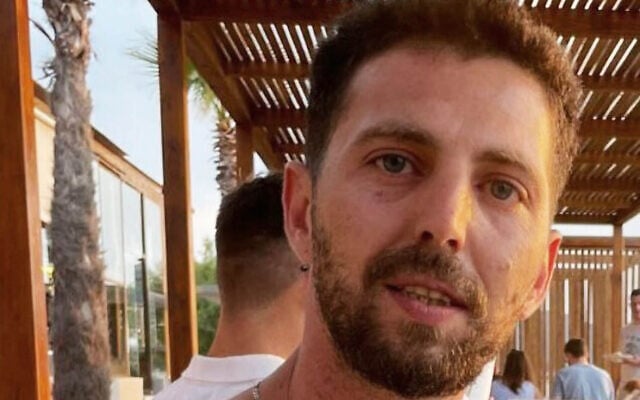
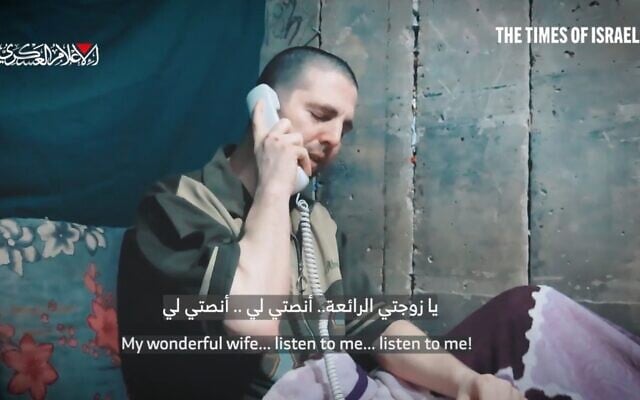
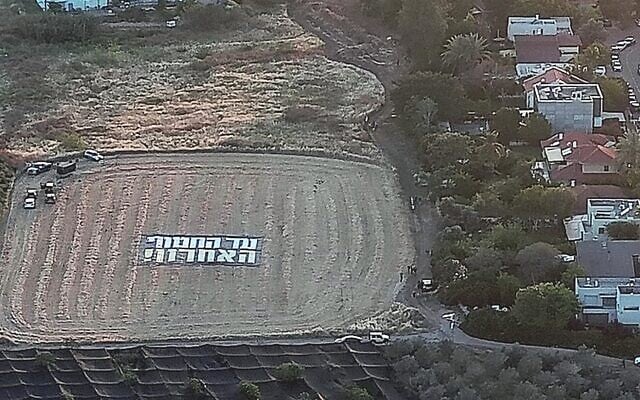
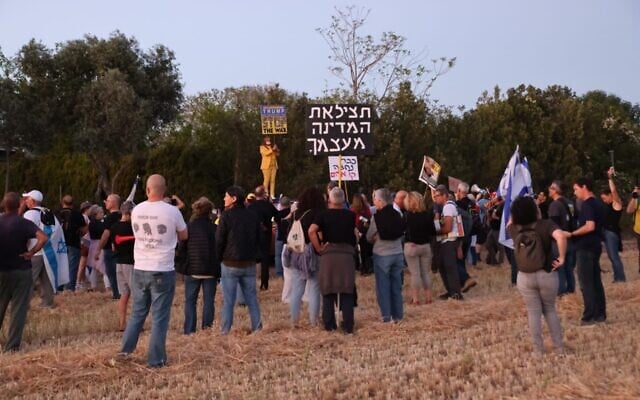

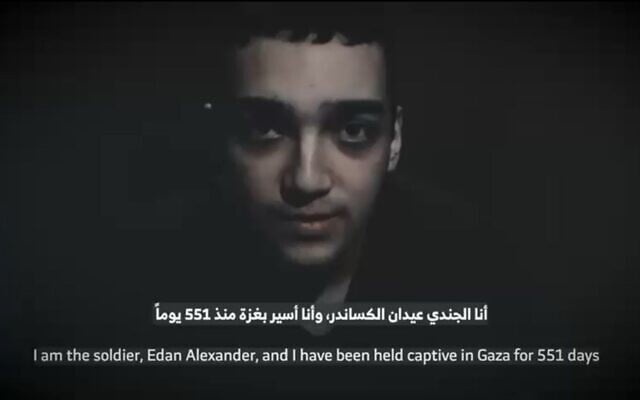
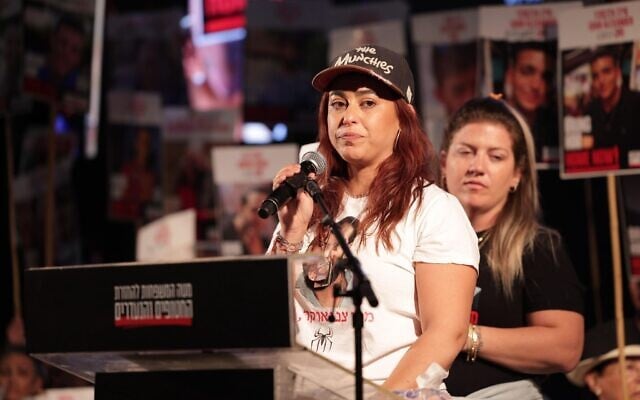
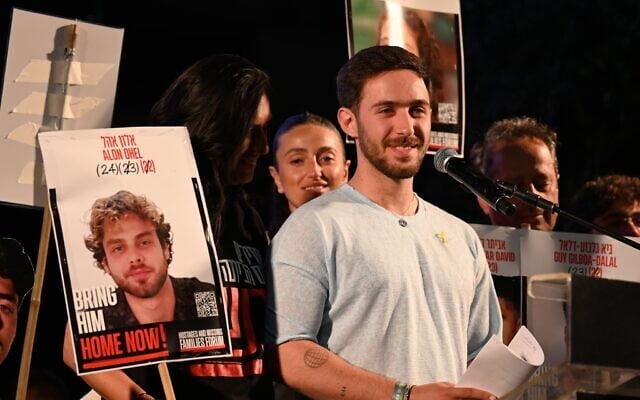
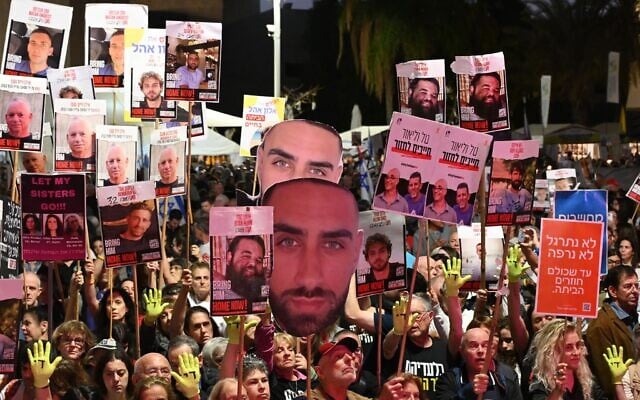
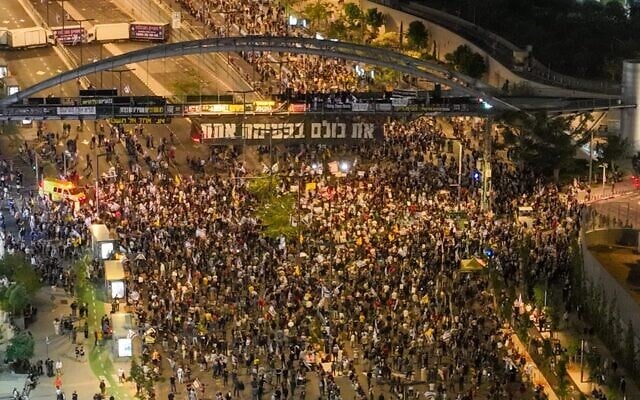
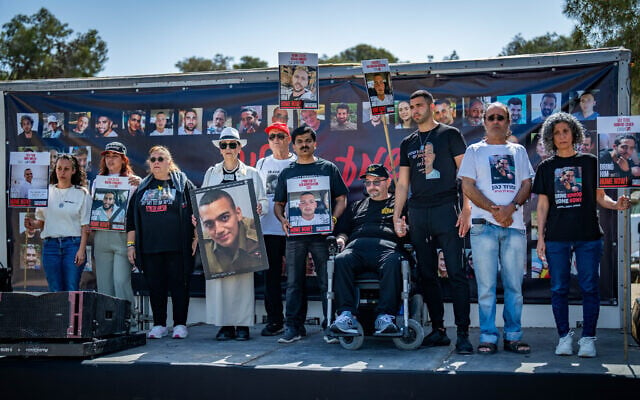



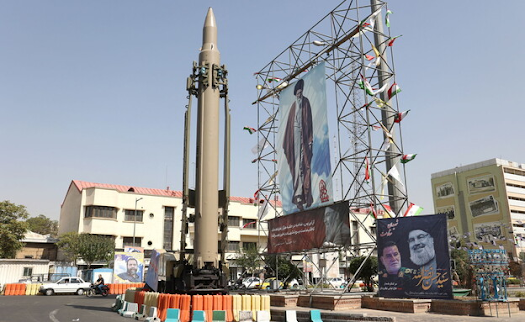














Comments
Post a Comment